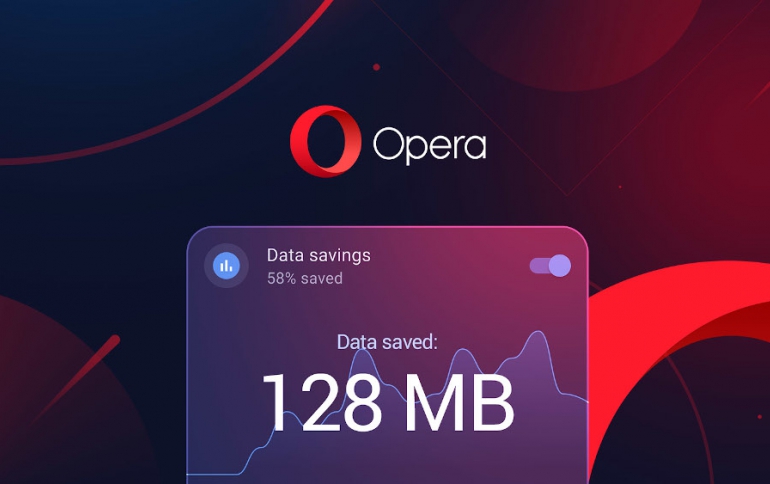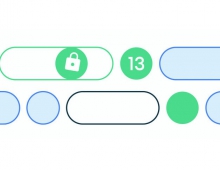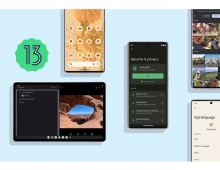
New Opera for Android Offers More Data Savings, New Blockchain-browsing Features
Opera announced improvements to its flagship Android browser (Opera for Android) incuding several new features in the blockchain-browsing experience.
Opera for Android comes with a useful data savings feature. Presently, networks are under stress and some of us are experiencing slower connections due to the sheer volume of traffic. The European commission has successfully urged Netflix and other streaming services to switch from HD streaming to SD in times of peak demand as we stay home.
Opera says that it allows users to limit their network bandwidth use by switching on data savings mode in their settings. This allows them to load pages more easily and quickly, while using less data. To let users monitor the data savings, Opera has now placed a data savings badge on the left of the address bar, where everyone can see how much data has been saved as well as switch it off – if need be. The badge appears once data savings mode has been switched on in settings, and will stick around as long as data savings are enabled, or until the next browsing session.
To speed up browsing on congested networks, Opera recommends switching on the ad blocking function, which speeds up page loading. Opera’s ad blocker is publisher-friendly, allowing people to bypass it on their favorite websites and thus support content creators.
With this version of its Android browser, Opera is also introducing an improved offline pages experience, which allows users to save any website for offline reading. This means the offline pages section can become a collection of articles or websites we can engage with distraction-free in Airplane mode. It’s also a feature which will become handy once air travel is fully possible again.
Android users now also have the option to customize the storage location for their offline pages. This means no more space issues for those whose internal storage is full, but who have plenty of space on an external card. Having access to the physical file location also means that they can move offline pages freely between devices with simple file operations.
With this version of its Android browser, Opera is introducing autocompletion for Speed Dials, meaning that once users starts typing a word that matches the URL or title of their Speed Dial item, it will be autocompleted directly in the address bar, enabling them to simply tap go, without having to explicitly pick a suggestion from the drop-down list.
The newest Opera for Android release also includes some updates to the browser’s native crypto wallet, dApp explorer and Web 3 browsing capabilities.
After having introduced the feature in its native Scandinavia and later in the US, Opera now allows for crypto wallet top-ups around the world -- the rest of the EU, as well as Australia, New Zealand, Mexico and Switzerland.
Opera users are now also getting the ability to access the cloudless, decentralized web of the future through IPFS-protocol support, which rethinks the way we access data online. They can also send and receive cryptocurrencies more easily by registering .crypto wallet addresses in a way similar to .com or .org domains.
In December 2018, Opera introduced the first blockchain browser, Opera for Android, with a built-in crypto wallet and dApp explorer. Opera then added a built-in crypto wallet to its desktop browser as well as to its iOS browser, Opera Touch. It later introduced easy crypto-purchases in Scandinavia and the US and is now expanding them to more regions.
To make this possible, Opera is partnering with Wyre, a US cryptocurrency-brokerage firm, to enable easy crypto-purchases directly from the browser’s crypto wallet. Opera Android users in most countries can now buy Bitcoin (BTC) and Ethereum (ETH) using a Visa or Mastercard debit card.
Wyre’s solution on Apple devices (available in Opera Touch for iOS) works with Apple Pay, which makes it possible to top up an account in less than 30 seconds. In Opera for Android, you can easily use cards such as Revolut directly in the browser.
Opera now supports crypto top ups within the browser in Australia, Austria, Belgium, Czech Republic, Denmark, Estonia, Finland, France, Germany, Greece, Hong Kong, Ireland, Italy, Latvia, Lithuania, Luxembourg, Mexico, the Netherlands, New Zealand, Norway, Poland, Portugal, Slovakia, Slovenia, Spain, Sweden, Switzerland and the United States.
True crypto-geeks will appreciate the fact that Opera has also partnered with Unstoppable Domains, a blockchain naming system built on Ethereum.
Blockchain domain names are similar to .com or .org domains, the main difference being that they are stored on a decentralized public ledger (Ethereum). Registering .com or .org domains allows people to easily reach web addresses instead of having to type in a long IP address. A .crypto domain or wallet address works in much the same way, providing this experience on a blockchain. What this means in practice is that by owning a .crypto domain name, you can simplify your wallet address. Instead of sending someone a long set of numbers, you can use a short address like operafan.crypto, which makes it easier to send and receive cryptocurrencies in your wallet.
Web 3 is not just about enabling dApps or value transfer on the web, it’s also about rethinking the way we access data online. One of the important new Web 3 protocols which make this possible is IPFS.
IPFS is a protocol which allows you to store data on the web without having to rely on a single server or specific cloud service. How does it work? Instead of asking the network for a file using it’s address/location, the browser can ask the network for a file using it’s cryptographic hash (unique to the file). IPFS then takes care of delivering the file to the browser, wherever it is stored. Each network node stores only the content it is interested in, plus some indexing information which helps figure out which node is storing what.
When looking up a file to view or download, one asks the network to find the nodes that are storing the content behind a given file’s name. One doesn’t, however, need to remember the hash as every file can be found by human-readable names using a decentralized naming system like Unstoppable Domains or the Ethereum Name System (ENS).
This means that files, as well as websites, can be stored in a decentralized and secure way and accessed without relying on a single server – a truly cloudless form of storage similar to BitTorrent. Opera has partnered with Protocol Labs, the main actor behind the development of the IPFS protocol, to integrate this experience into Opera for Android





















